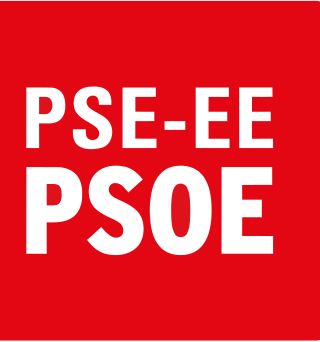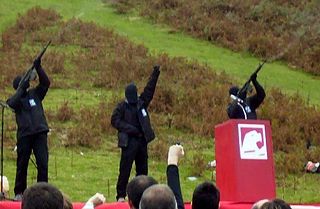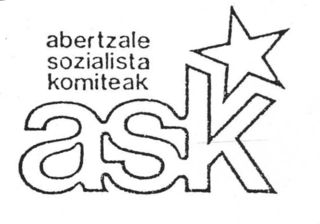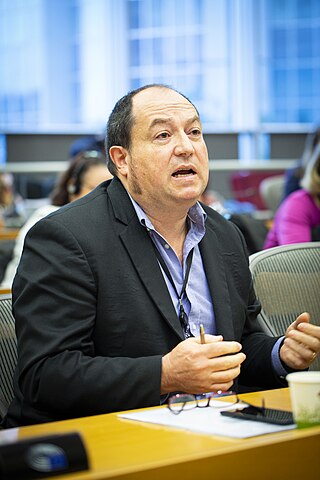Batasuna was a Basque nationalist political party. Based mainly in Spain, it was banned in 2003, after a court ruling declared proven that the party was financing ETA with public money.

Herri Batasuna was a far-left Basque nationalist coalition in Spain. It was founded in 1978 and defined itself as abertzale, left-wing, socialist, and supported the independence of the Greater Basque Country. It was refounded as Batasuna in 2001 and subsequently outlawed by the Spanish Supreme Court for being considered the political wing of the separatist group Euskadi Ta Askatasuna (ETA).

Euskadiko Ezkerra was a Basque socialist political organisation. It was founded as a coalition of Euskal Iraultzarako Alderdia and other Basque Marxist forces in 1977 to present lists for the Spanish general elections in the constituencies of Biscay, Gipuzkoa and Álava, while Navarrese Left Union (UNAI), an allied coalition, was to present a list in the constituency of Navarre.
Abertzale is a Basque term usually referring to people or political groups who are associated with Basque nationalism.
Communist Movement of Euskadi was originally the branch of the Communist Movement (MC) in Basque Country and Navarre, Spain. EMK was previously known as ETA Berri, a splinter group of ETA. EMK separated itself from MC in 1983. In 1991 EMK merged with LKI and formed Zutik in Basque Country. In Navarre EMK took part in forming Batzarre. Some of its most prominent leaders were Patxi Iturrioz, Eugenio del Río, Rosa Olivares Txertudi, Milagros Rubio, Jesús Urra Bidaurre and the brothers Javier and Ignacio Álvarez Dorronsoro.

The Socialist Party of the Basque Country–Basque Country Left is a social-democratic political party in the Basque Country that acts as the regional affiliate of the Spanish Socialist Workers' Party (PSOE).
The Basque National Liberation Movement was an umbrella term that comprised all social, political and armed organizations orbiting around the ideas of the illegal armed organisation Euskadi Ta Askatasuna (ETA), proscribed internationally as a terrorist organisation.

People's Socialist Revolutionary Party was a non-legal Basque political party, considered commonly to be the political branch of ETA. It always ran as part of the coalition of the Basque National Liberation Movement, Herri Batasuna, until its self-dissolution in the 1990s. The party's acronym "HASI" means "to begin" in Basque language.

Aralar was a Basque socialist and separatist political party in Spain. It was opposed to the violent struggle of ETA.

The Basque conflict, also known as the Spain–ETA conflict, was an armed and political conflict from 1959 to 2011 between Spain and the Basque National Liberation Movement, a group of social and political Basque organizations which sought independence from Spain and France. The movement was built around the separatist organization ETA, which had launched a campaign of attacks against Spanish administrations since 1959. ETA had been proscribed as a terrorist organization by the Spanish, British, French and American authorities at different moments. The conflict took place mostly on Spanish soil, although to a smaller degree it was also present in France, which was primarily used as a safe haven by ETA members. It was the longest running violent conflict in modern Western Europe. It has been sometimes referred to as "Europe's longest war".

Santiago Brouard or Santi Brouard was a doctor and Basque politician. He was one of the leaders of Herri Batasuna, and deputy mayor of Bilbao. He was killed by the Spanish government's death squad, the Grupos Antiterroristas de Liberación (GAL), in one of its highest-profile acts. Broaurd was shot by GAL gunmen Luis Morcillo and Rafael López Ocaña as he left his paediatric clinic in Bilbao.

Eusko Alkartasuna is a Basque nationalist and social-democratic political party operating in Spain and France. The Basque language name means Basque Solidarity and abbreviated as EA. The party describes itself as a "Basque nationalist, democratic, popular, progressive and non-denominational party". The party has adopted the slogan "Euskal Sozialdemokrazia".

Revolutionary Communist League was a political party in Spain. It was founded in 1971 by members of the Catalan group Comunisme, a split of the Popular Liberation Front (FLP). The LCR had a trotskyist ideology, adopting more heterodox political positions in the 1980s.
Eusko Alderdi Sozialista was an underground revolutionary socialist Basque political party.
Euskal Herriko Alderdi Sozialista was an illegal revolutionary socialist Basque political party, with presence in both Spanish Basque Country and the French Basque Country.

Herriko Alderdi Sozialista was a revolutionary socialist Basque political party, with presence only in the French Basque Country.

Abertzale Sozialista Komiteak was a grassroots socialist and pro-self-management movement in the Basque Country. Its origins were the Herri Batzarak movement in Bizkaia.
Basque Socialist Party or Basque Socialist Assembly was a socialist Basque political party, with presence in the Southern Basque Country. The party was illegal until 1978.
The Euskadiko Sozialisten Batasuna was a clandestine political movement in the Southern Basque Country, Spain, formed in 1959, and active under Francoist Spain. It was the Basque sister organization of the Spanish Popular Liberation Front (FELIPE) and the Catalan Workers' Front of Catalonia (FOC).

Joxe Pernando Barrena Arza is a Basque politician, former member of the Parliament of Navarre and member of the European Parliament for Spain.












